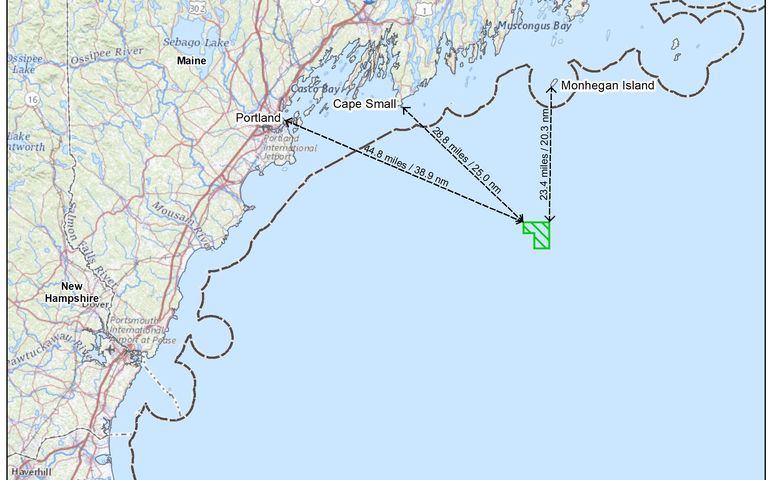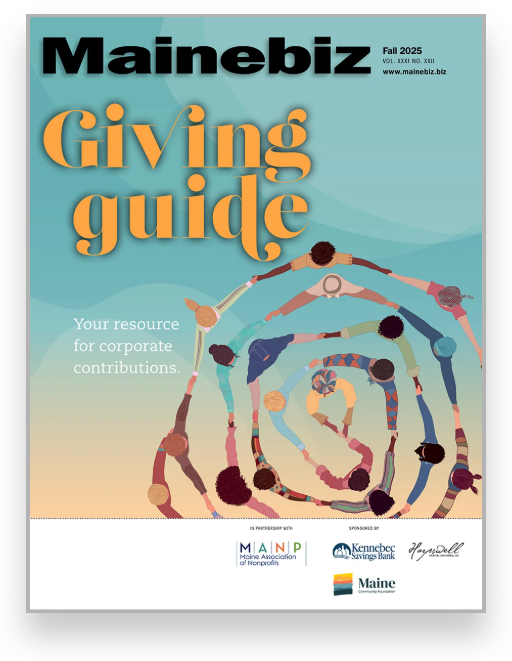Processing Your Payment
Please do not leave this page until complete. This can take a few moments.
- News
-
Editions
View Digital Editions
Biweekly Issues
- October 20, 2025
- October 6, 2025
- September 22, 2025
- September 8, 2025
- August 25, 2025
- August 11, 2025
- + More
Special Editions
- Lists
- Viewpoints
- Our Events
- Calendar
- Biz Marketplace
Maine seeks lease for nation's first offshore wind research site on federal waters
 Courtesy / Governor's Energy Office
Maine is seeking a lease to conduct offshore wind research on 15.2 square miles located 29 miles from the nearest mainland point of Cape Small in Sagadahoc County, 23 miles from Monhegan and 45 miles from Portland.
Courtesy / Governor's Energy Office
Maine is seeking a lease to conduct offshore wind research on 15.2 square miles located 29 miles from the nearest mainland point of Cape Small in Sagadahoc County, 23 miles from Monhegan and 45 miles from Portland.
The state of Maine has applied to lease a little more than 15 square miles of ocean for a floating offshore wind research area in what would be the nation's first such undertaking in federal waters.
In a 143-page application to the U.S. Department of the Interior's Bureau of Ocean Management, the Governor's Energy Office notes that Maine is uniquely qualified to hold the research lease, which will be limited to 12 or fewer turbines located nearly 30 miles offshore.
The distance is meant to avoid nearshore waters valuable to fishing and recreation, in line with the state's new moratorium on development of offshore wind in state waters. The moratorium was imposed in response to concerns by Maine fishermen about the potential impact of wind projects on their industry.
Securing a lease to conduct research in federal waters will allow the state to use patented technology developed at the University of Maine and help Maine meet long-term climate change goals through wind energy, which represents a $1 trillion opportunity worldwide by 2040, according to the application.
“Maine is uniquely prepared to create good-paying jobs across the state and reduce our crippling dependence on fossil fuels through the responsible development of offshore wind technology,” said Gov. Janet Mills. “The research project will help establish the best way for our state to embrace the vast economic and environmental benefits of offshore wind."
She also said she believes that "that offshore wind and Maine’s fishing industry can not only coexist, but can help us build a stronger economy and a brighter, more sustainable future for Maine people.”
The site area would be limited to 15.2 square miles, which is smaller than initial projections and represents around 0.04% of the 36,000-square-mile Gulf of Maine. The site is located 29 miles from the nearest mainland point of Cape Small in Sagadahoc County, 23 miles from Monhegan and 45 miles from Portland.
The location was chosen following a public outreach process led by the Governor's Energy Office, which included an analysis by the Maine Department of Marine Resources to identify areas that minimized known potential impacts on the fishing industry.
To develop and operate the research area, the state of Maine would partner with New England Aqua Ventus, a joint venture of Mitsubishi Corp. subsidiary Diamond Offshore Wind and Germany's RWE Renewables. A law (LD 336) passed by state lawmakers in June, and signed by Mills, directs the Maine Public Utilities Commission to enter into contract negotiations for a power purchase agreement for the research array.
The Mills administration sees harnessing wind power asked tool in meeting the state's climate goals of moving Maine to using 80% of renewable energy by 2030 and 100% by 2050, to curb harmful greenhouse gas emissions. The effort has a direct link to the Gulf of Maine, where surface temperatures are warming faster than nearly ever other body of water in the world.
'Key first step'
Martin Grohman, executive director of the Environmental and Energy Council of Maine, or E2Tech, welcomed the lease application as a key first step in securing a sustainable economic future for Maine.
"None of it works if we don't figure out offshore wind," he told Mainebiz. "None of the economic growth and opportunity, none of the cutting pollution. So it has got to be done. This is a key first step."
Dana Connors, Maine State Chamber of Commerce president and CEO, had a similar reaction.
“As we continue to fight climate change, Maine businesses stand ready to seize the opportunity and build expertise to adapt to the 21st-century renewable energy economy," he said in a prepared statement. "As we move forward, it is important to have an open dialogue and do everything we can to be inclusive, including and especially Maine’s fishing industry. Ensuring a collaborative outcome will serve to make offshore wind and our state stronger.”
Mainebiz web partners
Related Content

The Giving Guide
The Giving Guide helps nonprofits have the opportunity to showcase and differentiate their organizations so that businesses better understand how they can contribute to a nonprofit’s mission and work.
Learn More
Work for ME
Work for ME is a workforce development tool to help Maine’s employers target Maine’s emerging workforce. Work for ME highlights each industry, its impact on Maine’s economy, the jobs available to entry-level workers, the training and education needed to get a career started.
Learn More
Groundbreaking Maine
Whether you’re a developer, financer, architect, or industry enthusiast, Groundbreaking Maine is crafted to be your go-to source for valuable insights in Maine’s real estate and construction community.
Learn more-
The Giving Guide
The Giving Guide helps nonprofits have the opportunity to showcase and differentiate their organizations so that businesses better understand how they can contribute to a nonprofit’s mission and work.
-
Work for ME
Work for ME is a workforce development tool to help Maine’s employers target Maine’s emerging workforce. Work for ME highlights each industry, its impact on Maine’s economy, the jobs available to entry-level workers, the training and education needed to get a career started.
-
Groundbreaking Maine
Whether you’re a developer, financer, architect, or industry enthusiast, Groundbreaking Maine is crafted to be your go-to source for valuable insights in Maine’s real estate and construction community.
ABOUT
NEW ENGLAND BUSINESS MEDIA SITES
No articles left
Get access now
In order to use this feature, we need some information from you. You can also login or register for a free account.
By clicking submit you are agreeing to our cookie usage and Privacy Policy
Already have an account? Login
Already have an account? Login
Want to create an account? Register
Get access now
In order to use this feature, we need some information from you. You can also login or register for a free account.
By clicking submit you are agreeing to our cookie usage and Privacy Policy
Already have an account? Login
Already have an account? Login
Want to create an account? Register











0 Comments